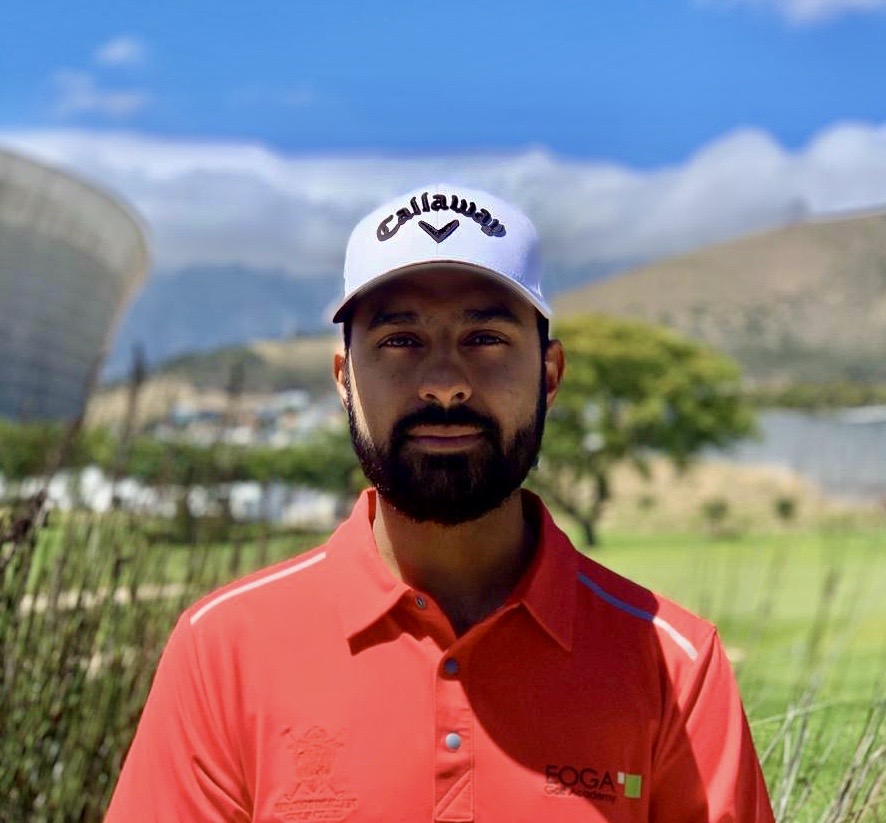Coach Profile: Yusuf Raidhan
Posted by
Introduced to golf at a young age, Yusuf Raidhan grew up in the southeast African country of Malawi. His passion for the game grew the more he’d play with his father and brother. Over the next 20+ years, Yusuf would go on to work with some of the best instructors in the world from the UK, to Spain, USA and South Africa.

Zach:
When you were first playing golf, what about it did you like the most?
Yusuf:
A combination of things. When I first started playing golf, it was obviously just sort of tagging along because my brother and my dad did it. Once I got a little bit older is when I started understanding why I enjoyed playing golf. But I grew up playing team sports, like field hockey, cricket, football (soccer), and so golf was somewhat in the background. I was super passionate about it, but my friends didn’t play. So I sort of would tag along and do
what they did.
The one thing that drew me to the game though was that came very naturally to me. I was half decent of all the other sports. But at golf, I was like, “wait a second, I actually could get the hang of this.” And then, just like with any golfer out there, I got bitten by the bug and I got super hooked and just love the fact that I could just sort of challenge myself. It’s a very individual sport. Every day was different. I’d spend hours and hours practicing and it was awesome.
Growing up in a small country called Malawi, there were no golf coaches, no real good facilities, etc. So I was self-taught up until the age of 16. I learned the game through watching TV, watching guys golf swings and trying to replicate. That was my challenge, and I absolutely loved it.
Zach:
It’s incredible to pretty much be self-taught most of your life. And then on top of that, become a coach. What made you want to go into coaching?
Yusuf:
Like any aspiring golfer, my main goal was to play for a living. I think if you speak to the majority of the coaches, that was sort of the first choice, right? So that was my focus. Towards the end of when I realized that I’m not going to make it and that the chances were looking more and more slim, I wanted to cement a sort of position in the golfing industry.
I am passionate about the game; that’s all I’ve known for the last 20 odd years. So when I gave up playing, I was like, “I need to do something here to help me continue to work in the field that I’m so passionate about.” And I was somewhat of a golf swing junkie. I’ve worked with some of the best coaches in the world on my own game. So once I left Malawi, I was able to travel the world a little bit, which was great. I’ve always enjoyed the dynamic of teaching and I’m lucky that I’m a bit of a sucker for numbers. So I thought, okay, there are so many pathways within the golf industry: you can become a golf director, you go into the management operations, etc, etc. I thought, you know what, I actually want to coach.
Fortunately, I was able to meet extremely influential coaches in South Africa and obviously connect with the ones that I worked with abroad, whether they’d be in the UK or US, and sort of pick their brain a little bit. Once I started doing that, started seeking advice and talking about sort of philosophies and stuff, I was hooked.
Zach:
You said you played cricket before. I know here in the States, a lot of kids play baseball growing up. There’s similarities there between the golf and baseball swing, but there’s also a lot of difficulties adjusting. Are there any similar struggles you had with that when it came to cricket and then golfing?
Yusuf:
Personally, no, because I didn’t play cricket at the level that I sort of solely focused on it, where I would have gotten engrossed in my batting technique, which would have had the biggest influence on my golf swing.
But I do see it in clients. The clients that have a cricket background, you see it right away. Yes, they have absolutely unbelievable hand-eye coordination or generally have the benefit of a very much straight back up, straight down sort of golf swing. But the golf swing is in more of a circular motion. So you definitely see the impacts cricket can have on your on your golf swing.
Zach:
It’s funny to think, whether it’s cricket, baseball, tennis, or any of these other sports where you’re focusing on a ball coming in at a pretty high speed it comes easy. But then here you are in golf, little white ball right in front of you, and it’s the most difficult thing to hit.
Yusuf:
It’s definitely the hardest one in the world. And again, I just think that’s what makes it so special. It’s different every day. Some days it feels easier than others, and some days you feel like you’re an absolute beginner, even though you’ve been playing for years. So I think that’s the beauty about the game.
Zach:
What are some of the benefits you’ve found coaching on Skillest? How has it helped both you and your students?
Yusuf:
I was skeptical when I started, but I think those I think all the questions that I had were answered within the first couple of months once I started teaching on the platform. In terms of for me personally as a coach, the biggest advantage of Skillest and online coaching is as a coach, you can make a very informed decision. In an in-person environment, if you come to me for a golf lesson and you’ve booked an hour with me and it’s the first time I’m seeing you, technically I have about ten minutes to make an informed decision on what I want to work on with you. It’s a very small time frame where you’ve got to make a decision to work on something specific. Whereas with online coaching, I can take a couple of hours to sit down and really analyze the golf swing and say, this is the path I want to take with this golfer, which I’ve found has been extremely beneficial. Not just for myself, but for the golfer as well, because they get much better information because I have more time to think about it and as a result, they get better quicker.
And the one thing I want to add about Skillest is the one thing that I found the most powerful, which I thought would probably not work, are the live lessons. The guys would have a phone on the tripod on a driving range with AirPods in, and I’ve had unbelievable success with all my subscribers so far that I’ve bought into the life lessons and it’s almost like you’re there in person. Once they start seeing those benefits, they absolutely love them too.
Zach:
What would you tell someone who was hesitant to take lessons?
Yusuf:
I think modern day coaching has become a lot more simplistic, even though people think it’s become too complicated. I think coaches are in a position where they can really saturate the information and give the golfer one or two cues to help them improve. But I think golfers are under the sort of mindset that if they go for a golf lesson, the golf coach is going to absolutely shred them to pieces and change everything. So the thing I’d say to a golfer is that you’d be surprised at how simple the information is and how much it can benefit you moving forward. Coaches are able to provide quality information in the most simplest form based on the characteristics of the person you have in front of you. I think what makes a really good coach is adjusting and adapting to what’s in front of you.
Also, there’s no such thing as a short term fix in golf. You’ve got to look at the the bigger picture. Yes, some changes settle in a lot sooner and you can start playing much better golf much quicker than other people. But if you want optimize efficiency and longevity, it’s all about investing in your game for the long run rather than just relying on one golf lesson to change your game.
Zach:
What’s your favorite course you’ve ever played on?
Yusuf:
I’ll have to say my home club growing up in Malawi it’s called Limbe Country Club. A nine hole golf course that’s never in the greatest condition, but that’s my home of golf.
Zach:
Those are kind of the best ones, right?
Yusuf:
Absolutely. I have way too memories there to ever think of any other golf course. I’ve played quite a few all over the world, but that’s right up there for me.
Zach:
What’s your favorite club in your bag?
Yusuf:
My two iron. It’s my go to. It’s a club that I can pull out and be like, “OK, I’m going to somewhat hit this in the direction that I want to.”
Zach:
If you didn’t play golf, what sport would you play?
Yusuf:
I absolutely love tennis. I’ve never been amazing at it, but I’d love to be really good at it. Funny enough, my New Year’s resolution is to start playing a lot more tennis.
Zach:
And if you had a “regular job,” what would you do?
Yusuf:
I’d probably be in the business field. I come from a very strong business background with my family. So probably that, sitting in an office somewhere miserable.
Zach:
Who would you love to play a round of golf with?
Yusuf:
Definitely Tiger Woods. I grew up in the Tiger Woods era. Your typical answer, but he was a big inspiration for me growing up. There’s a cricketer in South Africa named Hashim Amla, and he’s one of the greatest batsmen of all time. So I’d like to have him there. And then my big brother.
Follow Yusuf on Instagram & Facebook. His website is YRGolfConsulting.com, and of course, he’s available for lessons on Skillest.
